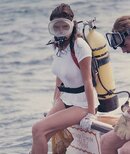I like the style and nature of freediving, but I heard it is very dangerous and could easily black out and die.
Well... no. You could not "easily" black out. Read on.
I am not a master freediver but I have done
some freediving. I will roughly and without excessive detail explain some basic facts below.
You should know that roughly speaking there are two gasses in blood: oxygen (O2) keeps you alive, and carbon dioxide (CO2) is the waste gas that triggers the need to breathe. You can't get any meaningfull amounts of extra oxygen from breathing air, but you could get rid of a lot of CO2.
Running low on oxygen in blood causes unconsciousness. It could (in some
well known situations) happen without you noticing it. Hence, it is avoidable. And even at this point your freediving safety diver would bring you to the surface and save your life. You never freedive alone. If you do not hyperventilate (breathe fast and deep and a lot) prior to the dive then you are basically safe. This means that you should not artificially lower the CO2 level by forcefull breathing (no matter how much you breathe, the blood oxygen content will not rise). The pressure drop after a deep dive is another factor, but depth comes with exerience so you will know what you are doing. AIDA has some excellent courses.
AIDA International
This passing out will not (in correctly executed freediving) happen without you knowing it, as the waste gas (CO2) accumulates in your blood stream and you go through various stages.
First come the pelvic thrusts that try to make you breathe, several of those, and they don't feel bad at all
once you get used to them. You will notice and count them. Then your muscles start using anaerobic energy (you can feel that) and your blood also becomes more acidic (which I feel in my nose). A lot is going on that you notice and are familiar with. You also know your dive history and what you every time achieve and what is your maximum limit. You will feel how the increasing carbon dioxide levels affect you. As time passes, holding your breath will become a challenge, but you can actually hold your breath untill you pass out. This however will NOT happen without you noticing it if you just avoided a few risk factors. If you forcibly ignore the warnings, then the world may fade out... More experienced freedivers may explain these thing to you in greater detail.
Freediving is pure joy. Free, light, quiet. You are one with the water.
One compromise would be to get a wetsuit, a side mount belt harness, minimal weights, and two three litre cylinders. The dive time would be limited (but 10x longer than in freediving) but the equipment would be extraordinary light. The bubbles can be really annoying though.
---------- Post added April 14th, 2015 at 03:19 PM ----------
Two commercials, but worth seeing:
https://www.youtube.com/watch?v=7Sv_Bv1H7BQ
https://www.youtube.com/watch?v=8ahQYqho7w4
You will want both





